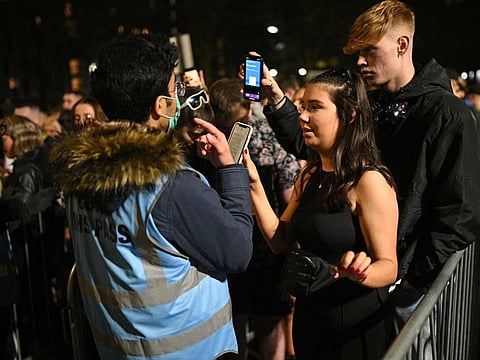UK makes omicron contingency plans for hospitals, schools
1 in 25 people in England had COVID-19 in the week before Christmas

London: The UK government has been making contingency plans in case hospitals, schools and other workplaces are hit by major staff shortages amid the country’s record-breaking spike in coronavirus infections.
Public sector workplaces have been preparing for staff absences ranging from 10 per cent to 25 per cent as COVID-19 sickens more people or forces them to isolate, the Cabinet Office said.
The highly transmissible omicron variant has caused Britain’s daily new caseload to soar over Christmas and the New Year, with a new daily high of 189,000 on December 31. About 1 in 25 people in England - or about 2 million people - had COVID-19 in the week before Christmas, the Office of National Statistics estimated. In London, the figure was 1 in 15.
Cabinet Office Minister Stephen Barclay said there had already been “significant” absences and the government was preparing for “every eventuality”.
“It’s important that those contingency plans are refreshed and that we take measures to mitigate those impacts,” Barclay said.
He cited increased support for virus testing in schools and warehouses, and perhaps better ventilation, as an example of how to prevent disruptions.
Devolved authorities in Scotland, Wales and Northern Ireland have imposed limits on events and social gatherings in the face of the fast-spreading omicron. But Health Secretary Sajid Javid says adding new restrictions is a “last resort” for England, despite the climbing daily infection rate.
The public had been advised to test themselves ahead of joining any New Year’s celebrations.
National Health Service leaders say absences have added to the heavy pressures on UK hospitals, even though the overall number of people being treated for COVID-19 remains much lower than last winter. NHS Providers chief executive Chris Hopson said staff have been working “flat out” and the early days of 2022 would be “crucial” in showing whether further measures are needed.
Secondary school students in England will be required to wear face masks when they return to classes after the Christmas holidays. Education Secretary Nadhim Zahawi said the move was an attempt to “minimise disruption” in schools and prevent teachers and pupils from being forced to stay at home.
The U.K. Health Security Agency has maintained its support for the seven-day isolation period for those who have contracted the virus and are fully vaccinated. But Paul Hunter, a professor of health protection at the University of East Anglia, told ITV that the requirement should be reduced to five days as studies had shown people were “very unlikely” to be infectious after this point.
The number of COVID-19 patients requiring hospital treatment across Britain has increased much more slowly than new infections, but in the last week reached its highest level since February 2021.
The government’s push to deliver COVID-19 boosters has now seen over 50% of the population receive a third dose.
Overall, the UK has reported more than 13.1 million infections and more than 149,000 deaths linked to COVID-19, the second highest death toll in Europe behind Russia.



